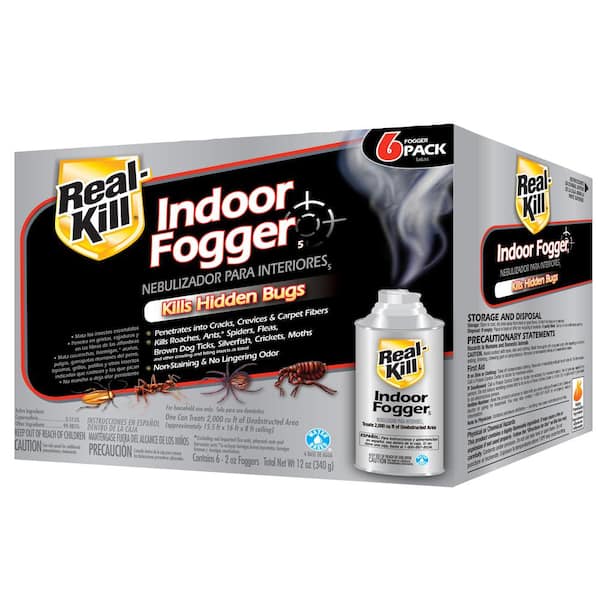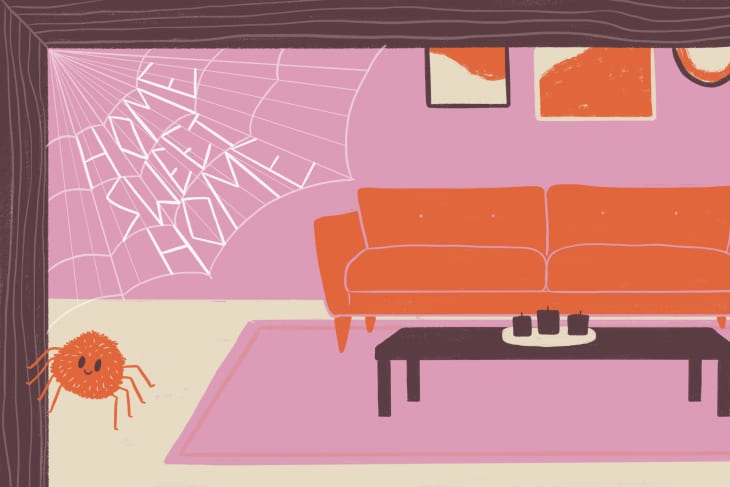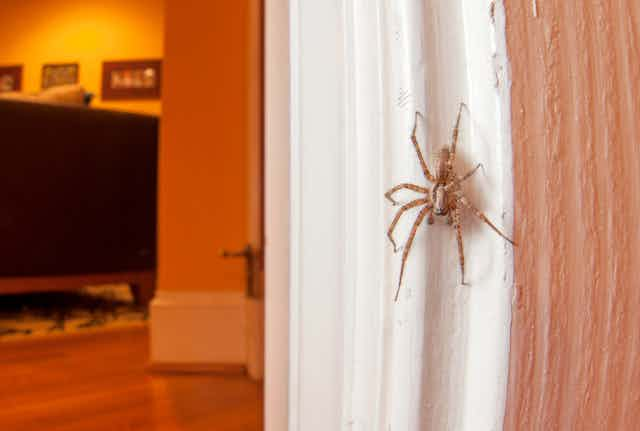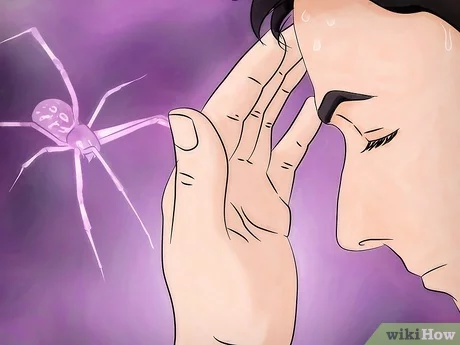Killing house spiders has its pros, such as reducing the fear factor and potential bites. However, it also disrupts natural pest control.
House spiders, often misunderstood creatures, play a pivotal role in our indoor ecosystems. These eight-legged arachnids are nature’s pest control agents, quietly disposing of other insects like flies, mosquitoes, and moths. While the sight of spiders may evoke fear in many, understanding their benefits can lead to a more harmonious coexistence.
Killing them might offer temporary relief from arachnophobia and reduce the risk of spider bites, albeit a rare occurrence. Yet, this act can lead to an imbalance, inviting more unwelcome pests into our homes. By considering both sides, homeowners can make informed decisions on how to manage their unintended house guests, aiming for a balance between comfort and ecological responsibility.

Credit: www.homedepot.com
Introduction To House Spiders
House spiders often stir mixed feelings. Some see them as unwanted guests, while others value their role in controlling pests. Understanding the pros and cons of their presence is key.
Common Species And Habitats
House spiders come in various species. Each prefers different corners of our homes to weave their webs. Let’s explore their common types and habitats.
- Cellar spiders – thrive in damp, quiet areas
- Wolf spiders – roam freely, don’t spin webs
- Jumping spiders – found near windows, on walls
- Common house spiders – spin webs in room corners
Role In The Ecosystem
Spiders play a crucial role in our homes and beyond. They regulate insect populations, serving as natural pest control. Their presence maintains a balanced ecosystem.
| Spider Type | Ecosystem Role |
|---|---|
| Cellar spiders | Control moth, mosquito populations |
| Wolf spiders | Hunt various ground pests |
| Jumping spiders | Eat flies, gnats, and more |
| House spiders | Manage indoor insects |

Credit: www.apartmenttherapy.com
Reasons Behind Killing House Spiders
Killing house spiders may reduce the risk of bites and webs in homes, yet it disrupts natural pest control. Understanding the balance of these actions helps homeowners make informed decisions about their indoor ecosystems.
Fear And Misconceptions
Many people fear spiders due to their appearance.
Misconceptions about spiders being harmful lead to fear.
Concerns For Health And Cleanliness
Spiders can contribute to dust and cobwebs in homes.
People may kill spiders for health and cleanliness reasons.
Advantages Of Living With Spiders
The thought of living with spiders might send shivers down your spine. Yet, these eight-legged creatures offer surprising benefits. Let’s explore the advantages of sharing our space with spiders.
Natural Pest Control
Spiders are nature’s own pest control agents. They feast on insects that we often consider pests. This includes mosquitoes, flies, and moths. By catching and eating these insects, spiders help keep their populations in check. This natural pest control reduces the need for chemical insecticides, which can harm more than just the targeted pests.
- Reduces mosquito bites
- Lowers fly populations indoors
- Decreases the risk of moth damage to clothes and fabrics
Contribution To Biodiversity
Spiders play a crucial role in maintaining the balance of ecosystems. They are a key part of the food web, serving as prey for birds, reptiles, and other larger animals. Their presence in your home garden can indicate a healthy, balanced ecosystem. By respecting spiders, we support biodiversity.
| Role | Benefit |
|---|---|
| Predators | Control pests |
| Prey | Feed other animals |
| Ecosystem indicators | Sign of a healthy environment |
Potential Downsides Of Coexistence
Living with house spiders has its downsides. Let’s explore some.
Risk Of Bites And Allergic Reactions
Spiders sometimes bite. A bite can hurt and swell. Some people might even feel sick. Not all spiders are dangerous, but it’s hard to tell them apart. We list a few common ones:
| Spider Type | Risk Level |
|---|---|
| House Spider | Low |
| Black Widow | High |
| Brown Recluse | High |
Allergic reactions are rare but serious. They need quick help.
Psychological Discomfort For Some Individuals
Many people feel scared of spiders. This fear is called arachnophobia. It’s one of the most common phobias. Seeing spiders can make some feel very scared. This can make living in their own home hard.
- Spiders make webs. Webs can make a house look dirty.
- Some people lose sleep over fear of spiders.
Respecting these feelings is important. Not everyone feels safe around spiders.
Environmental Impact Of Killing Spiders
The environmental impact of killing spiders is often overlooked. Spiders play a crucial role in our ecosystems. They help control insect populations. Understanding the effects of removing spiders is important for environmental balance.
Effects On Local Ecosystems
Spiders are integral to local ecosystems. They manage pests. These pests could otherwise overrun environments. Spiders’ predation supports biodiversity. Killing them disrupts this balance.
- Pollination assistance – Spiders eat insects that harm pollinators.
- Soil aeration – Some spiders dig burrows, helping soil health.
- Prey population control – They keep pest numbers in check.
Unintended Consequences On Food Chains
Food chains rely on predator-prey relationships. Spiders are key predators. Removing spiders can lead to unintended consequences.
| Insect Overpopulation | Decreased Plant Health |
|---|---|
| Without spiders, insect numbers can surge. | More insects can mean more plant damage. |
| Pesticide Increase | Other Predators Affected |
| More insects could lead to more pesticide use. | Animals that eat spiders might lose a food source. |
Each spider killed can cause a ripple effect. This can affect entire ecosystems. It is vital to consider these impacts before deciding to kill a spider.

Credit: theconversation.com
Humane Alternatives To Killing
Many people dislike finding spiders in their homes. Yet, killing them may not be the best solution. Humane alternatives exist. They respect both life and personal comfort.
Relocation Strategies
Relocating spiders is a kind choice. It removes them without harm. Simple tools can assist in this task.
- Glass and Cardboard: Trap the spider under a glass. Slide cardboard underneath. Carry outside.
- Spider Catchers: These tools keep distance between you and the spider. They gently grip the spider for release outdoors.
Preventive Measures
Prevention is a proactive step. It stops spiders from entering the home. Several methods are effective.
- Seal Cracks: Use caulk to fill gaps in walls and foundations. It blocks entry points.
- Essential Oils: Some oils, like peppermint, deter spiders. Apply at entry points.
- Clean Regularly: Remove webs and declutter. Spiders prefer undisturbed areas.
- Window Screens: Ensure they are intact. Fix any tears to prevent spiders from slipping through.
Public Perception And Education
The topic of house spiders often triggers a variety of emotions in people. Public perception greatly influences whether these arachnids are seen as pests or partners in our homes. Education plays a key role in shaping these views. Let’s explore how media and awareness campaigns contribute to our understanding of house spiders.
Influence Of Media On Attitudes
Media often portrays spiders as scary and dangerous. This shapes public opinion. People may kill spiders based on what they see on TV or online. Scary spider images can lead to unnecessary fear. Some media, however, show the benefits of spiders. They help control pests like mosquitoes and flies.
Importance Of Awareness Campaigns
Educational campaigns are vital. They teach us about spider behavior and benefits. Correct information can reduce fear. Schools and nature groups often lead such efforts. They use facts to show spiders’ role in our ecosystem. With better understanding, people may think twice before killing a spider.
- Media can misrepresent spiders.
- Educational efforts can change perceptions.
- Spiders are important for pest control.
Conclusion: Balancing The Ecosystem And Human Preferences
Conclusion: Balancing the Ecosystem and Human Preferences often involves tough choices. Spiders play a key role in our homes. They manage pest populations. Yet, their presence sometimes scares or bothers us.
Best Practices For Homeowners
Dealing with spiders means being responsible. You can prevent them without harm. Seal cracks and keep spaces clean. Use natural repellents like peppermint oil. These methods respect spider lives and keep homes comfortable.
- Inspect and seal entry points.
- Clean regularly to deter insects.
- Relocate spiders outside gently.
Final Thoughts On Ethical Considerations
Consider the ethical side. Spiders deserve respect. They are living beings. They contribute to biodiversity. Before acting, think about non-lethal options. Share your space. Embrace nature’s balance. Let spiders thrive outside.
- Reflect on the spider’s role.
- Choose non-lethal methods.
- Respect all living creatures.
Frequently Asked Questions
Are House Spiders Dangerous To Humans?
Most house spiders are harmless to humans and prefer avoiding contact. They rarely bite unless threatened, and their venom is not potent enough to harm humans significantly.
What Benefits Do House Spiders Offer?
House spiders help control insect populations, as they feed on common pests. Their presence can reduce the number of insects in your home, contributing to a more comfortable living environment.
Can Killing Spiders Attract More Spiders?
Killing a spider doesn’t necessarily attract more spiders. However, it may be a temporary solution as other spiders may fill the vacant space if the underlying insect issues remain unresolved.
What Are The Ecological Impacts Of Killing Spiders?
Killing spiders can disrupt the local ecosystem balance. Spiders are important predators in their habitats, and removing them can lead to an increase in the populations of pest insects.
Conclusion
Deciding on the fate of house spiders can be a dilemma. On one hand, they control pests; on the other, they may cause discomfort. Remember, coexistence is key, as these creatures play a vital role in our ecosystem. Weighing the pros and cons carefully will guide your choice, ensuring a balanced home environment.
Related posts:

I’m MD Tanvir, and I bring years of expertise gained from working closely with pest control companies to the forefront. My journey in the industry has inspired me to launch Bug Battler, a platform aimed at equipping people with the know-how to combat pests autonomously. Through Bug Battler, I aim to empower individuals with practical insights to tackle pest infestations effectively.

